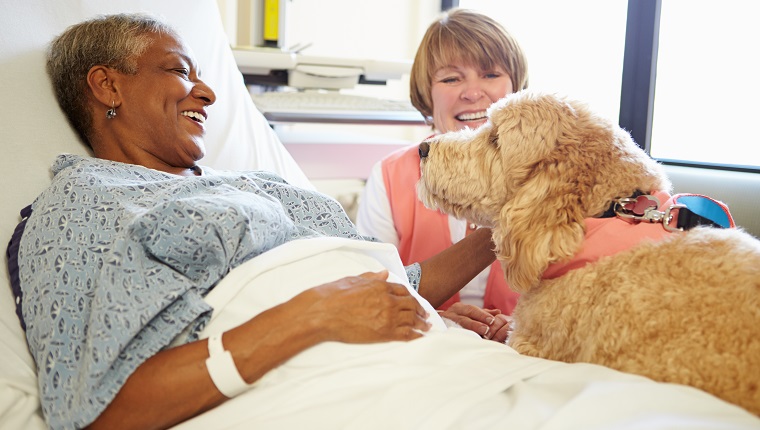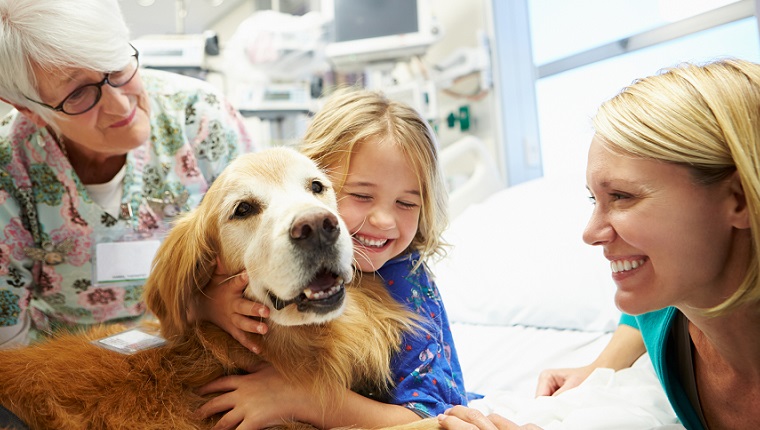Therapy dogs bring joy and comfort, not only to their owners, but to patients and people in need. They are more than just the loyal companions that most dogs are–sometimes they can even save lives on a daily basis. However, therapy dogs who make regular rounds in the hospital may be more exposed to bacterial spread and unconsciously become carriers for certain infections.
Some of these infections can be dangerous to patients, especially those who already have weakened immune systems. If you ever have a therapy dog, work near one, or see one in the hospital, you may be worried about them transmitting bacteria or diseases. However, a new study showed that following some simple protocols for cleaning therapy dogs–a “dog wash”–greatly reduces the risk of spreading infections.
Therapy Dogs Need ‘Dog Wash’
The study presented at Johns Hopkins Hospital looked at four therapy dogs to discuss how transmission of Methicillin-Resistant Staphylococcus Aureus (MRSA) can be curbed. Badger, Pippi, Poppy, and Winnie regularly visited 45 young patients undergoing treatment for cancer who did not have a MRSA infection.
The study showed that patients who interacted with the dogs who went through normal cleaning procedures (bathing before arrival at the hospital) were six times more likely to become MRSA carriers. However, the risk fell when the therapy dogs went through a new “dog wash” protocol.
Following the new procedure, the dogs bathed in antibacterial soap prior to arriving. During their visits, handlers wiped the dogs down with antibacterial wipes every few minutes. Taking these simple “dog wash” steps made a huge difference. Patients who interacted with the dogs were no more likely to become MRSA carriers than those who never interacted with the dogs.
According to Dr. Kathryn Dalton, regularly bathing therapy dogs with antibacterial shampoo is the key to preventing the infection’s spread. During visits, it’s best to use antibacterial wipes every five to 10 minutes when they are making their rounds. Wipes contain chlorohexidine, which is generally used for disinfection and sterilization.
“This innovation of cleaning the dogs so they don’t become a vector for transmission is really important. For humans, it’s washing your hands. This is a way of washing the dogs and making them as safe as possible in a very vulnerable population,” said Dr. Chris Nyquist.
Everyone, from handlers to patients, must ensure that they do their part in keeping themselves and others safe from infection. Regular disinfection is crucial to avoid the spread of diseases within the hospital.
How Therapy Pets Can Become Carriers

Spotting a dog who may not seem healthy and avoiding them is not an effective strategy. This is because dogs can carry germs and bacteria without showing symptoms or looking sick. At the same time, for patients who have an infectious illness, it’s best to skip a visit with a therapy dog to avoid further infection.
Simple changes in routine and interaction between therapy dogs and patients can help control infection. Always use an allergy deterrent and barrier sheets on beds. Avoid shaking the paws or giving therapy dogs a high-five. Paws constantly come into contact with the ground where germs mostly are. Take the extra precaution to avoid potentially picking up the germs that the dogs may have gotten from hospital floors.
The Value Of Therapy Dogs
Everyone has to do their part in containing infection because therapy dogs are too valuable to the community. As many as 50,000 certified therapy dogs in the U.S. currently provide hospital patients comfort and security.
“Sometimes it’s just an opportunity for free interaction and engagement with the dog, which is also valuable,” said Suzanne Thompson. She is a coordinator at the Wake Forest Baptist’s Animal-Assisted Therapy program.
Don’t neglect the care for your therapy pet, either. MRSA can be fatal to therapy dogs. Add coconut oil to therapy dogs’ diets, as it can do wonders for curbing and reducing the growth of certain bacteria.
Dogs who weigh up to 10 pounds can benefit from half a teaspoon of coconut oil per day. Dogs who weight 25 pounds should get a teaspoon of it. Give one and a half teaspoons to 50-pound dogs, and 2.5 teaspoons to those at the 100-pound mark. Some dogs need to get used to a new diet. Put small amounts of coconut oil and gradually increase until you reach the desired amount. Talk to your vet about doing this safely.
What are your thoughts on this crucial preventive measure? Let us know in the comments below!
Related Articles:
How To Register Your Dog As A Therapy Animal
What Is MRSA Infection In Dogs? Symptoms, Causes, & Treatments




